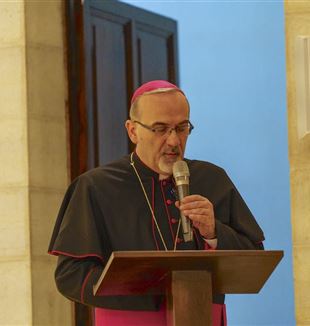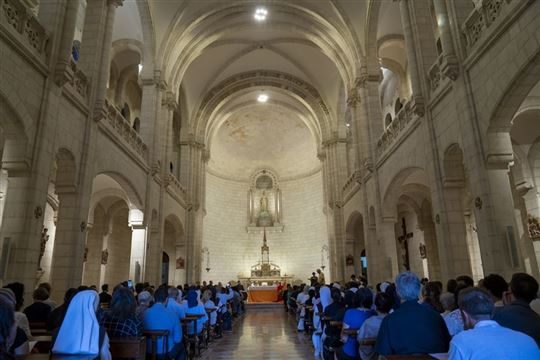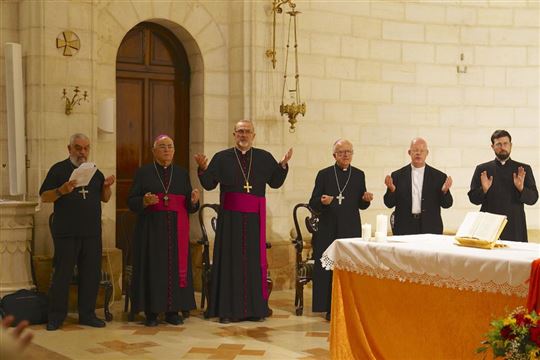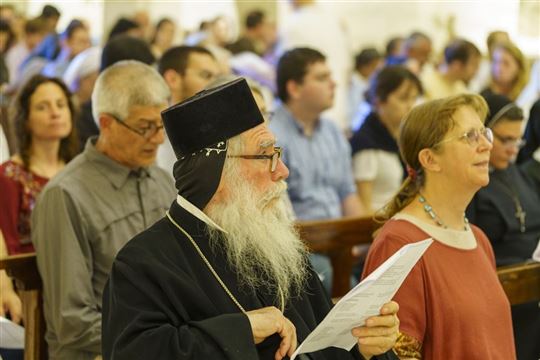
Jerusalem: for a new pentecost
A challenge issued by the Patriarch, Monsignor Pizzaballa, to the members of movements and new communities in the Holy Land, from which a dialogue was born that has become a moment of community and friendship.Marcel's eyes are shining, her voice steady, there is complete silence in the church of St. Vincent de Paul in Jerusalem. Recounting her son Jack's story of grace and faith means re-living a mother's ordeal in the face of a nine-year-old's hopeless illness. It is a cross impossible to bear alone, a pain too dull, the cry for meaning too loud. Supporting Marcel and her husband, Boulous, both morally and concretely, are their friends of the Focolare movement, in which they have been involved for some time but whose companionship became fundamental to cope with Jack's illness.
Months later, his parents speak of gratitude for God's mysterious plan, which through the simple faith of a sick child, drew them back to Him. "On his last evening, the Holy Spirit gave us such strength that Jack was assured that we would be at peace," says Marcel with her husband beside her. "We experienced a supernatural peace, which has not left us since. Even when we miss him so much." Their faces speak more than their words of the presence of the Comforter in their lives, as in the lives of the other friends who take turns at the altar to witness their experience, according to the creativity that can only be of the Holy Spirit. 
Every story begins with the encounter with an ecclesial movement, in the different corners of the world, and reaches all the way to their present in the Holy Land. There are many new communities in the Church of Jerusalem, but this year the synodal journey has involved them all for the first time, leading them all to organize the Vigil of Pentecost together in the presence of the Patriarch, Monsignor Pierbattista Pizzaballa. A group of them formed the choir, and the choice of songs, biblical texts and testimonies is the fruit of a journey that began almost as a provocation, on the occasion of the diocesan phase of the Synod.
"What can be the contribution of the movements here?" reflected Pizzaballa in a dialogue at the beginning of the year, with more than 70 members of the movements and new communities present in the Holy Land. “First of all, get to know each other and make yourselves known. You have to go out, in a critical, free, serene way to really listen to each other." At the end of that meeting, they accepted the proposal of a married couple, Agnes and Jean, from the charismatic community of Emmanuel, to organize the Vigil of Pentecost together. Then everyone went back to their jobs, their community, and their daily routine took over. But a few months later, Agnes returned to the task. In that dialogue she had perceived something new for her life and did not want to lose it. She still does not quite know how. They began in small groups, with different languages, backgrounds and ages. Yet, when they told each other how Christ came into their lives, it was immediately obvious what united them. An unexpected experience of communion happened. What dominated is not the organization of a church event, but the interest in each other's experience. Liuba recounted her encounter in Germany with the Koinonia of St. John the Baptist, unknown to most until that dinner at the Focolare in the Jerusalem; Felipe spoke of how he became a priest by encountering the Neocatechumenal Way in Chile; Marinella talked about the experience of the Memores Domini, the call to which she had begun to sense at university; Sobhy, a Maronite deacon, spoke of his encounter with Fr. Giussani during his studies in Rome... The evening ended without even beginning to talk about the Vigil, but the desire to meet again to listen to the experience of those who had not had time to speak prevailed in everyone.
The proposal was to meet again in the Community of the Beatitudes at the Emmaus Nicopolis: almost all the movements adhered. They were able to get to know each other better and proposed the idea of cenacles in the cities where there are at least two communities. Thinking back to the Patriarch's invitation to go out to the local Church with humility, respect and realism – the forces available are few and there are many difficulties in a Church divided by borders, languages and rites – the proposal arose to return to the experience of the beginning, of the apostles in the Upper Room waiting for Pentecost. This would involve moments of prayer and sharing, conducted freely in small groups together with other friends, communities, parishes.
Agnes and Jean opened their doors to the small coordinating committee. Each meeting began with a prayer, led each time by a friend from a different movement. It only lasted a few minutes but was essential, asking the Spirit to keep their hearts burning, like the apostles at Emmaus. There was no lack of discussion due to differing opinions, but they began to experience that communion needs flesh and blood to physically make room for the other, to wait for him or her, to accept what they can freely give you. "The new Pentecost" began to take shape and the desire was to share it with as many friends as possible.
Jerusalem, Bethlehem, Nazareth, Haifa. "During the preparation of the cenacle, one of us proposed that each movement organize a section," says Meggy, "but it was immediately clear that that was not the way forward: the purpose was not to present the individual movements, but to communicate the new experience lived together." A more strenuous, but more interesting path. A path where those who thirst for authentic sharing can feel at home.
For Mirella, a Roman who has been living in United States, the cenacle held by the Capuchin friars in Jerusalem was an opportunity to meet with friends from Communion and Liberation again, whom she had not attended since her university days. "That evening I realized what I had missed during these years in the United States: the experience of community," she says, recalling her two vacations with the Sapienza University students more than 30 years ago. "It was an experience that I have always carried in my heart." Mirella left with a book by Fr. Giussani in her suitcase, received as a gift during the last School of Community in Bethlehem.
Then the group of friends involved in the organization of the Vigil shared fragments of life and experience with the Patriarch. "The experience of community can be a contribution of the movements to the life of the Church in the Holy Land," Pizzaballa says. "Real communities, not institutional ones, in which one can experience that the other does not make you lose yourself but enriches the identity of each of us. The risk we run is that we often perceive movements as divisive. But your experience indicates that you have not divided the Church, you have enriched it with something beautiful. A seed has been sown, let us see how it grows. Without the claim of 'having to do something,' but freely and authentically: it must spring from the truth of our relationships. The fire of Pentecost is not a fire made of straw, it is a real and permanent fire, which we only have to rekindle."
Read also - "Movements and New Communities," the formation on Charisms
The Patriarch has set a meeting for after the summer to see together what the next steps of the journey might be. In the meantime, friendship does not go on vacation. Fr. Felipe has invited friends from Jerusalem to a barbecue with songs in the Neocatechumenal community on the Mount of Olives, because "I, who thought I was coming to bring so much to you, felt very poor." In Haifa, Chiara and Hussam, a young oncologist who met Fr. Giussani in Turin, this has been an opportunity to deepen the friendship born with some families of the Focolare that they had met at Mass in their parish. "We attended one of their meetings, similar to our School of Community," Hussam says."It turns out that they were talking about the figures of Martha and Mary. Jesus never leaves us alone...."